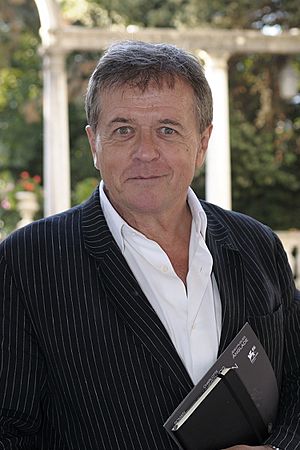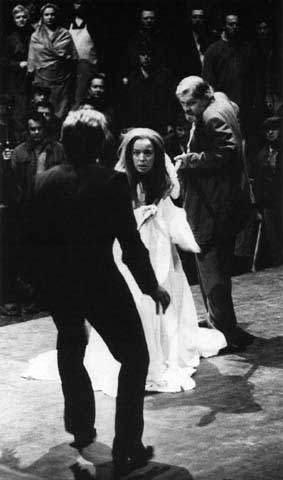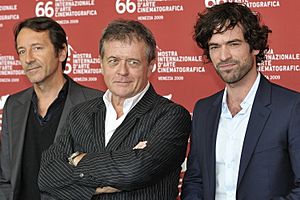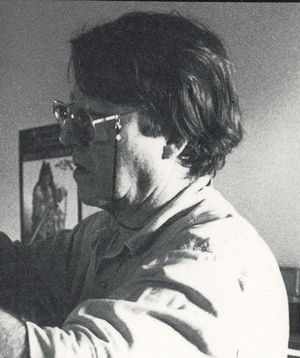Patrice Chéreau facts for kids
Quick facts for kids
Patrice Chéreau
|
|
|---|---|

Chéreau in 2009
|
|
| Born | 2 November 1944 Lézigné, Maine-et-Loire, France
|
| Died | 7 October 2013 (aged 68) Paris, France
|
| Occupation |
|
| Years active | 1966–2013 |
| Awards |
|
Patrice Chéreau (2 November 1944 – 7 October 2013) was a famous French director, filmmaker, and actor. In France, he was best known for his work in theatre. Around the world, he was famous for his movies like La Reine Margot and Intimacy. He also directed a very famous opera, the Ring Cycle, at the Bayreuth Festival in 1976.
Patrice won nearly 20 film awards, including the Cannes Jury Prize and the Golden Berlin Bear. He even led the jury at the Cannes Film Festival in 2003.
Starting in 1966, he became the artistic director of the Public-Theatre near Paris, in Sartrouville. He worked with a great team there, including stage designer Richard Peduzzi, costume designer Jacques Schmidt, and lighting designer André Diot. They worked together on many projects later on.
Later, in 1982, he became the director of the Théâtre Nanterre-Amandiers in Nanterre. He directed many plays there by famous writers like Jean Racine, Marivaux, and Shakespeare. He also staged works by Jean Genet, Heiner Müller, and Bernard-Marie Koltès.
He also directed several operas. Some of his famous opera works include Lulu in Paris (1979), Wozzeck in Berlin (1994), and Tristan und Isolde in Milan (2007). His last opera was Elektra in 2013. He received the Europe Theatre Prize in 2008 for his amazing work.
Life and Career
Early Life and First Steps
Patrice Chéreau was born in Lézigné, France. His father, Jean-Baptiste Chéreau, was a painter, and his mother, Marguerite Pelicier, was a graphic designer. He went to school in Paris. From a young age, he loved visiting the Louvre museum and became very interested in art, movies, theatre, and music.
When he was just 12, he started designing stage sets for plays. By the time he was 15, he was already well-known to critics in Paris. He was celebrated as a theatre genius for his work as a director, actor, and stage manager at his high school theatre. In 1964, at age 19, he began directing plays professionally. He started studying at the Sorbonne, but he left to focus on his theatre career.
Directing in Sartrouville (1966)
In 1966, Chéreau became the artistic director of the Public-Theatre in Sartrouville, a suburb of Paris. He was full of "idealism and inventiveness." He turned the theatre into a place for everyone in the town. It offered not just plays, but also movies, concerts, poetry readings, and discussions about many topics.
His theatre team included costume designer Jacques Schmidt, stage designer Richard Peduzzi, and lighting designer André Diot. He worked with them on many projects throughout his career. In 1969, he directed his first opera, L'italiana in Algeri, for the Spoleto Festival. He used his Sartrouville team for this production too.
In 1970, he started a close working relationship with the Piccolo Teatro in Milan, Italy. He directed Shakespeare's Richard II in Paris that same year. His first time directing for the Paris Opera was in 1974 with Offenbach's Les contes d'Hoffmann.
The Bayreuth Ring Cycle (1976)

In 1976, Patrice Chéreau directed Wagner's famous opera series, Der Ring des Nibelungen, at the Bayreuth Festival in Germany. This was a special event because it celebrated 100 years since Wagner's work was first performed there. This production became known as the Jahrhundertring (Centenary Ring).
Chéreau worked with conductor Pierre Boulez on this project. Their French team completely changed how people understood Wagner's operas in Germany. Chéreau set the story in the time when the music was written, looking at ideas like capitalism and industry. Many critics said his staging set a new standard for future Ring Cycle productions.
The Ring production was filmed for television in 1980. At first, it caused some debate, but by its final performance in 1980, it was celebrated with a 45-minute standing ovation.
Opera in Paris (1979)
In 1979, Chéreau directed the first full performance of Alban Berg's opera Lulu at the Paris Opera. Pierre Boulez conducted the music, and Richard Peduzzi designed the sets. The story was set around 1930, the time when the opera was composed.
Directing at Amandiers (1982)
From 1982, Chéreau became the director of his own theatre, the Théâtre Nanterre-Amandiers in Nanterre. He was the first to stage several plays by Bernard-Marie Koltès. He also directed plays by Marivaux and Shakespeare's Hamlet. He staged Mozart's opera Lucio Silla in 1984.
More Films (1983)
In 1983, Chéreau directed the film The Wounded Man. His 1994 film, La Reine Margot, was based on a historical novel by Alexandre Dumas. This movie won the Jury Prize and Best Actress Award at the Cannes Film Festival. It also won five César Awards.
La Reine Margot was set in the 16th century and showed the conflict between Catholics and Protestants in France. It included battles and the St. Bartholomew's Day massacre. This film was Chéreau's longest and most expensive production, and it was his biggest financial success. In 1992, he also acted in the movie The Last of the Mohicans as General Montcalm.
International Opera and Later Films (1993)

Chéreau's staging of Berg's opera Wozzeck was shown from 1993 to 1999 in Paris and Berlin. It was filmed in 1994. His direction of Mozart's Don Giovanni was shown at the Salzburg Festival from 1994 to 1996.
In 1998, he directed the film Those Who Love Me Can Take the Train. Chéreau's only English-language film was Intimacy (2001). In 2003, he directed His Brother, a film about two brothers.
His staging of Mozart's Così fan tutte was shown in 2005 and 2006. In 2007, he directed Wagner's Tristan und Isolde in Milan. He also directed Leoš Janáček's From the House of the Dead, which was shown at several festivals and at the Metropolitan Opera in New York. Chéreau's last film was Persécution (2009). His very last production was the opera Elektra by Richard Strauss, performed in July 2013.
Later Life and Passing
Patrice Chéreau passed away in Paris on 7 October 2013, at the age of 68.
Europe Theatre Prize
Patrice Chéreau received the Europe Theatre Prize in 2008. The award recognized him as a "natural-born artist" who succeeded in many different art forms. The prize also noted his important collaborations with his creative team, including set designer Richard Peduzzi, costume designer Jacques Schmidt, and lighting designer André Diot.
He was praised for his deep understanding of plays and for bringing new life to lesser-known works. His interpretation of Marivaux's plays, for example, showed the writer as a sharp social critic. The award also highlighted his move into opera, especially his famous and sometimes controversial direction of Wagner's Ring at Bayreuth.
His many years at the Théâtre des Amandiers in Nanterre were seen as a high point in his career. There, he helped discover and promote Bernard-Marie Koltès, one of the great playwrights of their time. Chéreau also directed works by Shakespeare, Ibsen, and Jean Genet. Finally, the prize mentioned his move into cinema, where he found a way to show the truth of life that he valued so much.
Filmography
Director
- La Chair de l'orchidée (1975)
- Judith Therpauve (1978)
- L'Homme blessé (1983)
- Hôtel de France (1986)
- Contre l'oubli (1991)
- Queen Margot (1994)
- Dans la solitude des champs de coton (1996, TV version)
- Those Who Love Me Can Take the Train (1998)
- Intimacy (2001)
- His Brother (2003)
- Gabrielle (2005)
- Persécution (2009)
Producer
(for his company "Azor Films")
- L'Homme blessé (1983)
- Chéreau – L'envers du théâtre (1986, TV documentary)
- Patrice Chéreau, Pascal Greggory, une autre solitude (1995, TV documentary)
- Intimacy (2001)
- Son frère (2003)
- Gabrielle (2005)
- Così fan tutte (2005, TV)
Actor
- Trotsky (1967, by Jacques Kébadian)
- Danton (1982, by Andrzej Wajda) as Camille Desmoulins
- Adieu Bonaparte (1985, by Youssef Chahine) as Napoléon Bonaparte
- The Last of the Mohicans (1992, by Michael Mann) as General Montcalm
- Bête de scène (1994, Short, by Bernard Nissille) as Le metteur en scène
- Dans la solitude des champs de coton (1996, TV version) as Le dealer
- Lucie Aubrac (1997, by Claude Berri) as Max
- Time Regained (1999, by Raoul Ruiz) as Marcel Proust (voice)
- Nearest to Heaven (2002, by Tonie Marshall) as Pierre
- Time of the Wolf (2003, by Michael Haneke) as Thomas Brandt (final film role)
Himself
- Chéreau – L'envers du théâtre (1986)
- Il était une fois dix neuf acteurs (1987, TV)
- Patrice Chéreau, Pascal Greggory, une autre solitude (1995, TV)
- Freedom to speak (2004)
TV Guest Appearances
- Bleu, blanc, rose (2002, TV)
- Claude Berri, le dernier nabab (2003, TV)
- Thé ou café 14 September 2003
Film Awards and Nominations
| Year | Award | Category | Title | Result |
|---|---|---|---|---|
| 2003 | 7 d'Or | Screenwriting (shared with Anne-Louise Trividic) | His Brother (2003) | Nominated |
| 1996 | BAFTA Awards | BAFTA Award for Best Film Not in the English Language (shared with Pierre Grunstein) | Queen Margot (1994) | Nominated |
| 2003 | Berlin International Film Festival | Golden Bear | His Brother (2003) | Nominated |
| Silver Bear for Best Director | Won | |||
| 2001 | Golden Bear | Intimacy (2001) | Won | |
| Silver Bear for Best Actress (Kerry Fox) | Won | |||
| Blue Angel | Won | |||
| 1998 | Cannes Film Festival | Palme d'Or | Those Who Love Me Can Take the Train (1998) | Nominated |
| 1994 | Jury Prize | Queen Margot (1994) | Won | |
| Best Actress Award (Virna Lisi) | Won | |||
| Palme d'Or | Nominated | |||
| 1983 | Palme d'Or | The Wounded Man (1983) | Nominated | |
| 2006 | César Awards | César Award for Best Adapted Screenplay (shared with Anne-Louise Trividic) | Gabrielle (2005) | Nominated |
| 2002 | César Award for Best Director | Intimacy (2001) | Nominated | |
| 1999 | César Award for Best Director | Those Who Love Me Can Take the Train (1998) | Won | |
| César Award for Best Original Screenplay (shared with Danièle Thompson and Pierre Trividic) | Nominated | |||
| 1995 | César Award for Best Film | Queen Margot (1994) | Nominated | |
| César Award for Best Director | Nominated | |||
| César for Best Original Screenplay (shared with Danièle Thompson) | Nominated | |||
| César Award for Best Actress (Isabelle Adjani) | Won | |||
| César Award for Best Cinematography | Won | |||
| César Award for Best Costume Design | Won | |||
| César Award for Best Actor in a Supporting Role (Jean-Hugues Anglade) | Won | |||
| César Award for Best Actress in a Supporting Role (Virna Lisi) | Won | |||
| César Award for Best Editing | Nominated | |||
| César Award for Best Music Written for a Film | Nominated | |||
| César Award for Best Production Design | Nominated | |||
| César Award for Best Actress in a Supporting Role (Dominique Blanc) | Nominated | |||
| 1983 | César Award for Best Original Screenplay (shared with Hervé Guibert) | The Wounded Man (1983) | Won | |
| 2009 | Chicago International Film Festival | Career Achievement Award | Won | |
| 2005 | Gold Hugo | Gabrielle (2005) | Nominated | |
| 1998 | Gold Hugo | Those Who Love Me Can Take the Train (1998) | Nominated | |
| 1983 | Gold Hugo | The Wounded Man (1983) | Nominated | |
| 1999 | Étoiles d'Or | Étoiles d'Or for Best Director | Those Who Love Me Can Take the Train (1998) | Won |
| 2001 | European Film Awards | Audience Award for Best Director | Intimacy (2001) | Nominated |
| 2001 | Louis Delluc Prize | Prix Louis-Delluc | Intimacy (2001) | Won |
| 2002 | Lumières Award | Best Director | Intimacy (2001) | Won |
| 2001 | Rio de Janeiro International Film Festival | FIPRESCI Prize for Best European Film | Intimacy (2001) | Won |
| 2008 | SACD Awards | Won | ||
| 2009 | Venice Film Festival | Golden Lion | Persécution (2009) | Nominated |
| 2005 | Golden Lion | Gabrielle (2005) | Nominated |
See also
 In Spanish: Patrice Chéreau para niños
In Spanish: Patrice Chéreau para niños
 | Valerie Thomas |
 | Frederick McKinley Jones |
 | George Edward Alcorn Jr. |
 | Thomas Mensah |


